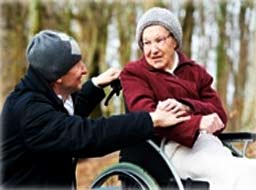The number of councils providing Meals on Wheels to vulnerable older people has dropped below 50% for the first time.
Research for the The National Association of Care Catering (NACC) reveals just 48% of UK authorities provide a service compared with 66% only two years ago.
The NACC says under-investment puts the elderly at risk and will place unnecessary pressure on the NHS because meals services help prevent hospital admissions and extend the time residents can live at home.
NICE has previously identified better nutritional care as the third largest source of cost savings to the NHS.
The study, carried out by the Association for Public Service Excellence (APSE) on behalf of NACC for Meals on Wheels Week (7-11 Nov), revealed:
-
The North West of England is doing the least with only 17% of authorities providing a meals on wheels service (regional breakdown below)
-
91% of providers expect there to be further reductions in service over the next 12 months.
-
Only half of those providing a meals on wheels service do so 365 days a year
-
£4.30 is the average cost of a two-course lunch which could prevent unnecessary ‘bed blocking’ hospital stays (the cost of keeping someone in hospital is an estimated £400 per day – Department of Health, 2015)
-
The best region is Northern Ireland where there is still 100% provision of meals on wheels
The average meals on wheels service supplies around 60,000 meals per year but it is not statutory so councils can remove the service to save money even though malnutrition accounts for nearly £20bn of health and social care spending in England (BAPEN, 2015*).
NACC chairman Neel Radia fears continued cuts endanger vulnerable residents and place a huge strain on the NHS.
He said: “This is a very worrying trend. Meals on wheels is so much more than just a meal – it’s a vital preventative service, and prevention is better than cure. It helps reduce unnecessary malnutrition and malnutrition-related illnesses and is a lifeline to those who are alone and isolated with no support.
“Meals on Wheel services can include wellbeing and safety checks. It’s about looking out for people in our communities who have contributed throughout their lives, and doing it in a human and caring way.
“We understand that local authorities have a problem with social care funding and we are not placing the blame solely with them. Council budgets are under immense pressure but withdrawing a service that can help keep someone out of hospital is a false economy in the long run because unnecessary hospital stays and bed blocking are a huge problem for the NHS.
“Some authorities do not take the nutritional side to Meals on Wheels seriously enough and we have even seen instances in the past where councils have stopped providing the service and directed people to fast food outlets on their website which is appalling.
“Nationally, budgets for health and social care have begun to be merged so that money can be spent more effectively. In Northern Ireland, where health and social care budgets have already been merged, the service coverage is 100 per cent. Clearly in Northern Ireland, the benefits of hot food delivered to those in need of a little help to continue living in their own home is rightly recognised.
“We want to see meals on wheels services expand across the UK as more authorities are empowered to spend health and social care budgets in a coordinated way for the best long-term solution for taxpayers and customers.”
Meals on wheels coverage by region: 2014-2016
North West 48% 17%
North East 25% 17%
South East 67% 17%
Yorkshire & The Humber 50% 38%
East Midlands 88% 50%
South West 71% 41%
West Midlands 60% 53%
London 69% 47%
East of England 64% 45%
Northern Ireland 100% 100%
Scotland 94% 59%
Wales 59% 45%
(The APSE research covered higher tier authorities in the UK. Councils were deemed to be providing Meals on Wheels if they are actively providing the service, whether contracted or in-house. Councils not considered to be providing the service may still be signposting members of the public to providers, who would not be monitored by the council. The 2014 study reflects those councils who said they were providing Meals on Wheels without making this distinction.)
About The National Association of Care Catering (NACC): NACC is a progressive organisation representing professionals providing catering to the care industry. They are recognised by Local Authorities, independent providers, the charitable sector and Government departments as a prime source of information and opinion on all aspects of catering within the care sector. NACC’s primary aim is to improve standards.
Help keep news FREE for our readers
Supporting your local community newspaper/online news outlet is crucial now more than ever. If you believe in independent journalism, then consider making a valuable contribution by making a one-time or monthly donation. We operate in rural areas where providing unbiased news can be challenging. Read More About Supporting The West Wales Chronicle
























